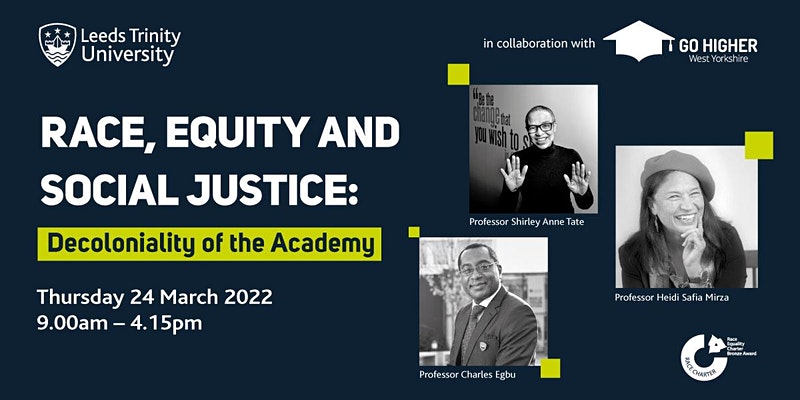Thoughts from Race, Equity and Social Justice: Decoloniality of the Academy

It was with both excitement and some nervousness that I clicked on the ‘presenter’ link I had been sent for the third Leeds Trinity University (LTU) Race Equality Conference. It took place on 24 March 2022 – almost exactly one year to the day that Go Higher West Yorkshire (GHWY) had its inaugural Decolonising the Curriculum network meeting.
LTU’s conference had a focus on decoloniality, with a particular emphasis on the impact of colonisation in the academy. I felt both humbled and pleased that LTU had invited GHWY – as an organisation committed to reducing inequalities in access to, success in and progression from higher education – to collaborate with them on this event.
Working in partnership was a clear thread running through the day and actually evidenced in practice, starting with a joint conference opener from Chelsey Grooby as President of LTU’s Students Union and Professor Charles Egbu as LTU’s Vice-Chancellor.
From my own perspective, I was hugely proud to be working alongside colleagues from GHWY’s Decolonising the Curriculum network – Dr Dermot Daly, Dr Laura da Costa and Steven Gleadall, though we took feed-in from across the network – to deliver a collaborative keynote speech about the benefits of working together and strength we have in numbers to make a bigger and more effective impact.
Our speech covered GHWY’s collaborative origins and its principles which fit well with the decolonisation agenda: that of equitable power relationships, equal voices and listening to the experiences of others to challenge our assumptions and perspectives. It also covered some of the challenges and successes that members of the network have reported and how providing a mix of both moral support and practical advice has helped. Ultimately, our message was that addressing decoloniality requires collaboration rather than competition between and within higher education providers.
We were sharing the bill with some big names:
- Professor Heidi Safia Mirza provided inspiration to be courageous in rethinking our approaches and their underlying power dynamics, to recreate an education system that is fit for purpose in new times.
- Professor Mark Mon Williams and Zahra Niazi covered research through the Born in Bradford project and its connectivity with communities through practical applications which are making a difference.
- Professor Catherine O’Connor talked about the power of including student voice and using co-creation to support a genuine positive impact for students.
- Ricardo Barker’s RE:Tension film was screened to really bring home the experiences of institutional racism on an individual.
There were also four workshops, and I attended Dr Arun Verma’s excellent session about staff experiences and becoming comfortable with disruption.
The day ended with a powerful panel discussion to reflect on why we are still having the same conversations about race more than 50 years after they were started.
The conference clearly struck a chord with attendees, with lively contributions and debate amongst attendees. I found the day to be extremely thought-provoking.
There was – quite rightly – a supportive challenge to GHWY as an organisation about what we are doing to tackle racism and inequality. Through our networks and the diversity of voices we are able to draw into our conversations, we have a great opportunity to listen more; to challenge assumptions and address unequal power relationships. Whilst we are making steps in this direction, and acknowledging that we are on a journey, now is the time for us to reflect on what more we can be doing. This is a conversation I am taking to the GHWY Board and I’ll be pleased to report back at a later date on our outcomes.
Helen Sykes, Go Higher West Yorkshire, Manager
